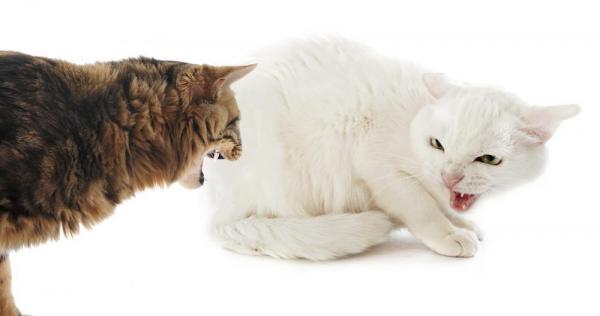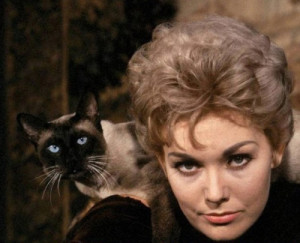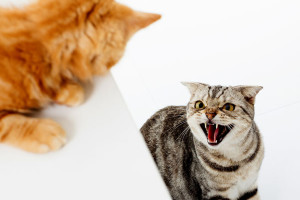It is hard for any cat parent when two of its Kitty Kids who have been the best of friends for years begin to quarrel over reasons unknown to its human. Adopting two or more cats definitely doubles the fun for some cats in a loving household as it offers opportunities to play and bond with one another.
But if years of fun begin to fade into negative emotions like jealousy and inter-cat aggression it becomes imperative for a cat parent to understand the root cause of ongoing conflicts. Understanding the reasons is important to prevent such fights from occurring.
So! Why two cats who have been living with each other for a while, suddenly start fighting or showing aggression towards one another.
1) Not Enough Opportunities Provided For Socialization To a Kitten: For a cat to be ideally socialized it should be provided with opportunities to meet other felines when it is between two to fourteen weeks old. This is a crucial period in terms of socialization as it is the time when a kitten’s personality is shaped along with cognitive functioning.
Kitties who haven’t been suitably socialized during their younger days face problems when paired with another cat when older. They are unable to easily make friends with their counterparts during adulthood.
[video width="640" height="480" mp4="https://www.petsworld.in/blog/wp-content/uploads/2018/03/alalam_636122140228731723_25f_4x3.mp4"][/video]
Cat Fight Video. ( Courtsey - http://media.alalam.ir)
2) Raging Hormones: Aggression in male cats is often noticed especially between two to four years of age when a cat attains social maturity and contends to win a mate. However conflicts are common between any gender in a wake to protect one’s own territory.
[caption id="attachment_17807" align="aligncenter" width="300"] Cat parents may consider the option of spaying/neutering their cats to prevent conflicts of this nature. Image - www.all4humor.com[/caption]
Cat parents may consider the option of spaying/neutering their cats to prevent conflicts of this nature. Image - www.all4humor.com[/caption]
3) Envy: A new cat’s entry into your heart and household is a reason big enough for the existing pet cat/s to feel insecure. A new cat tends to get more TLC from an owner especially in the initial days, helping it to adjust better. It becomes a necessity for feline parents to allot equal one on one time to its older brood as an assurance of your love for them. They should in no way feel that the new cat is the apple of your eyes. Rather spending a little extra time with older cats will help them get rid of their fears.
[caption id="attachment_17809" align="aligncenter" width="300"] Breeds like Siamese can get possessive of its humans and tend to establish a very close bond with them. Image- www.reprisesiamese.com[/caption]
Breeds like Siamese can get possessive of its humans and tend to establish a very close bond with them. Image- www.reprisesiamese.com[/caption]
4) Guarding One’s Territory: For some cats acting territorial is second nature to them. In a single cat household, the pet may turn very protective of its owner and home as it begins to regard both as its own/territory. Introducing a new feline in a home where only one cat existed up until now will surely pose problems for the new kitty. The existing cat may resort to defending its territory by being in no mood to share what it considers to be its own property. In case your two feline besties have started to quarrel a lot, you now know why!
[caption id="attachment_17810" align="aligncenter" width="300"] Surprisingly the territorial streak in your first cat may not surface initially at all. It may come up after many months or years of being introduced to the other feline. Usually cats tend to show their territorial nature upon attaining maturity and that is between the ages of two to five years. Image Credit - www.catster.com[/caption]
Surprisingly the territorial streak in your first cat may not surface initially at all. It may come up after many months or years of being introduced to the other feline. Usually cats tend to show their territorial nature upon attaining maturity and that is between the ages of two to five years. Image Credit - www.catster.com[/caption]
5) A Noisy Home Can Affect the Kitty Emotionally: Cats can easily get influenced by the vibe that dominates their home. If a household is particularly noisy, it can overstimulate a feline member. This over-stimulation caused by the excited energy circulating in the house might release in the form of aggression towards the other feline that is a part of the same household.
6) A Medical Issue: A cat could act aggressively with one or more felines around it due to a medical condition. In fact the aggression could also be targeted towards people to ward them off from touching it. Dental troubles, painful arthritis and excruciating wounds can make your cat act hostile towards you/other cats to protect itself from being touched and prevent more pain. An ageing cat tends to act aggressively due to failing eye-sight and hearing. Age-related neurological diseases lead to a change in the cat’s awareness, reduced responsiveness to stimulus, memory loss & decreased learning and can also be responsible for the antagonistic attitude.
Its best to talk to a vet to ascertain the medical condition at play and decide on suitable treatment procedures.
Determining the root cause of the problem is vital to a successful peace keeping operation. Putting a stop to cat fights and creating a harmonious situation for lasting peace will require a strategy depending upon the actual cause of aggression. A consistent approach by you will work the best.
